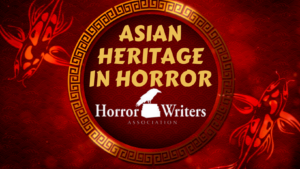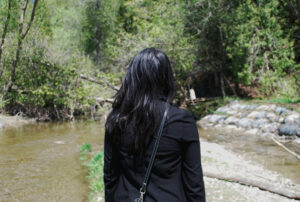Asian Heritage in Horror: Interview with Ashley Deng


Ashley Deng is a Canadian-born Chinese-Jamaican author of dark fantasy and horror. She holds a BSc in biochemistry, specializing her studies toward making accessible the often-cryptic world of science and medicine. When not writing, she is a hobbyist medical/scientific illustrator and spends her spare time overthinking society and culture. Her work has appeared in Nightmare Magazine, Fireside Magazine, Augur Magazine, and others. Her climate horror novella, Dehiscent, is available August 2023 from Tenebrous Press. You can find her at ashedeng.ca or on various social media as @ashesandmochi and @baroqueintentions.
What inspired you to start writing?
I was a voracious reader and daydreamer as a child, often putting myself into the scenarios of my favourite books or TV shows. I think even my earliest fanfiction work was veering more toward original fiction and I quickly pivoted after a year or so of fanfic, once I realized I could start writing the stories I really wanted to see. I thought, if I’m turning these stories that I love into something new, why not just make something new entirely?
What was it about the horror genre that drew you to it?
I’ve always been a lover of dark things, and although it took me a while to really accept that I wanted to write horror, I’ve been drawn to body horror elements in the arts and injecting dread into my work. For a while, I’d wanted to be a medical illustrator by profession, a field that I still hold a great fondness for and that has certainly influenced my views on things like gore. There’s a great amount of beauty in the inner workings of our bodies, and the field—along with gore and body horror as it’s used in the horror genre—invites us to confront the question of personhood and autonomy. Horror is such a fantastically flexible genre and I love its ability to say something intensely meaningful through the fringes of the human experience but also to wrench us away from the unfamiliar and make us deeply uncomfortable and have it force us to interrogate our reactions to what may, at first, seem grotesque.
Do you make a conscious effort to include Asian and/or Pacific Islander characters and themes in your writing, and if so, what do you want to portray?
I tend to write themes that are closest to me, and how those stories manifest will depend a lot on the direction I decide to take them. Sometimes it draws from my family’s cultural background, sometimes it draws from my own more personal relationship to said culture and also to the dominant culture that I grew up with here in Canada. I don’t believe in universal experiences, so my work tends to draw from where I can speak from, whether transformed through exaggeration or explored closely and introspectively.
What has writing horror taught you about the world and yourself?
Really embracing the horror genre has let me feel comfortable in writing the more grotesque stuff that I’ve always known I liked but felt scared or ashamed to admit to liking. And it turns out that a lot of my tastes actually lean a lot darker than I thought they did. It’s such a freeing experience to really write something I enjoy. Ultimately, I feel like horror provides us a lens, both to look at the world and to look at ourselves. It reaffirms our feelings that, yeah, the world sucks, it’s painful and broken and terrible, but it also allows us a catharsis about it.
How have you seen the horror genre change over the years? And how do you think it will continue to evolve?
I feel like there’s been something of a surge in popularity of the genre these past few years, though it’s certainly been with kind of mixed results. I think it’s cool that there’s more people getting interested in horror! It’s a bit less cool when those new people try to talk over existing conversations happening in the genre. Still, I’m hopeful that horror will become less stigmatized as a genre and that people can see the wealth of intelligent and sharp things it brings to the table, on top of the sheer fun of its more pulpy elements.
How do you feel the Asian and/or Pacific Islander communities have been represented thus far in the genre, and what hopes do you have for representation in the genre going forward?
Something that has always kind of struck me about horror and horror fans in general—even before I really dived into the genre myself—was just how willing they are to seek out international horror work. For the longest time, Silent Hill and Resident Evil were two franchises that were synonymous with the genre in my mind, and then came Junji Ito and a ton of Korean webcomics that leaked into non-horror spaces as jump scares and screamers. I think as horror fans—especially newer ones—start to explore the genre, they’ll discover the breadth of international horror already there for them, and I hope it leads to more awareness of all the AAPI creators in the genre.
Who are some of your favorite Asian and/or Pacific Islander characters in horror?
Does Ada Wong count? The Resident Evil games have a special place in my heart.
Who are some Asian and/or Pacific Islander horror authors you recommend our audience check out?
I’ve been keeping my eye on Naben Ruthnum, whose 2022 novella Helpmeet has stuck in my brain ever since I finished reading it. If you’re a fan of grisly body horror and beautiful stories about fragility and strength in relationships, I highly recommend it.
What is one piece of advice you would give horror authors today?
Get weird with it. Don’t be afraid to draw from your experiences and ask questions you might not yet have the answers to. Horror’s a great space to explore those and learn more about yourself. Find what speaks to you and identify why it speaks to you. Play with it, deconstruct it, make it your own.
And to the Asian and/or Pacific Islander writers out there who are just getting started, what advice would you give them?
Write what you want to write, not what you feel like you should be writing. Your work is so intensely personal to you and that should show! Don’t let other people’s expectations dictate what your writing should be.



